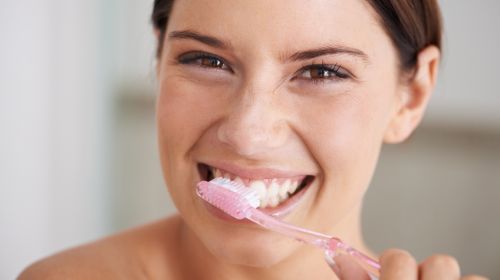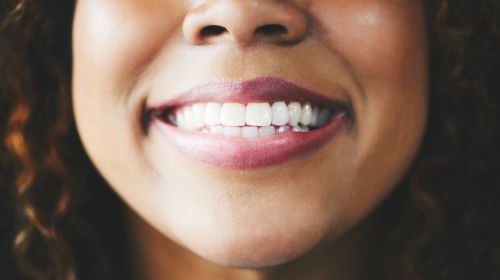Bad breath often occurs as a result of certain meals or is due to poor oral hygiene. Although bad breath is unpleasant, it can usually be eliminated with simple measures. However, constant bad breath should be checked by a doctor. What other causes are possible and what helps?
Quick overview: Frequently asked questions and answers
Why do I have bad breath even though I brush my teeth? Thorough oral hygiene is important to prevent bad breath. In addition to brushing your teeth, the spaces between your teeth should also be cleaned well, for example with dental floss, and plaque should be removed from your tongue. There may also be dental disease or other causes such as dry mouth. Persistent bad breath should definitely be checked by a doctor.
Which diseases cause bad breath? In particular, diseases of the mouth and throat can be associated with bad breath. Less commonly, diseases of the lungs or digestive tract can also lead to bad breath.
What does foul breath mean? Foul breath is usually a sign of bacteria in the mouth. Possible causes include tooth decay, inflammation of the gums or tonsils.
What does sour bad breath mean? If the breath smells sour, it is probably a stomach disorder or heartburn.
At a glance:
What is bad breath?
Bad breath is any form of unpleasant odor in exhaled air. The symptom is common and usually harmless in nature. For example, it occurs after eating certain foods.
But serious dental problems and poor oral hygiene can also lead to bad breath. In other cases, bad breath can even have pathological causes that absolutely need to be treated.
Forms of bad breath
In medical terms, the following terms are used in connection with bad breath:
Foetor ex ore: Unpleasant odor that is only detectable in the exhaled air from the mouth. In this case, the cause lies in the oral cavity or throat.
Halitosis: Bad breath, the cause of which is outside the oral cavity. The unpleasant smell can also be noticed when exhaling through the nose.
Symptoms: How is bad breath noticeable?
Many sufferers do not even notice that they have bad breath. If other people then ask them about it, they find it embarrassing.
Frequent bad breath can have an impact on the psyche or cause social anxiety in some people. Relationships can also suffer as a result.
Other people are convinced that they have bad breath, even though this cannot be proven professionally. Experts refer to this psychologically caused phenomenon as pseudohalitosis or halitophobia.
Bad breath? This self-test can help!
If you know that you have a tendency to bad breath, you can check your breath with a little trick: To do this, briefly lick the back of your hand. Then you wait until the saliva moisture has dried and smell your hand. This means that the bad breath can also be noticed by those affected themselves.
How does bad breath occur?
In around 80 percent of cases, the cause of bad breath lies in the oral cavity. It is caused by unpleasant-smelling compounds in the air we breathe, such as volatile sulfur compounds. These can arise, for example, when food residues are decomposed by bacteria in the oral cavity. The bacteria settle on the large, rough surface of the tongue with its numerous depressions, but also in the spaces between the teeth.
Bad breath is often a result of eating certain foods, but also poor or incorrect oral hygiene. Sometimes bad breath also occurs as a result of underlying diseases, for example in connection with tonsillitis or tonsil stones.
Common bad breath triggers at a glance:
- poor oral hygiene (plaque on teeth, tongue)
- certain foods like garlic or onions
- lots of coffee
- heavy smoking
- Dental problems, such as inflammation of the gums (gingivitis) or the periodontium (periodontitis)
- untreated tooth decay
- Dry mouth (xerostomia)
- Fasting and diets, as this reduces the flow of saliva
- Infections in the mouth or throat, such as oral thrush (fungal infection in the mouth and throat)
Less common causes of bad breath:
The following diseases can rarely lead to an unpleasant odor from the mouth and nose (halitosis):
Diagnosis: Examinations for bad breath
Since the causes of bad breath are usually located in the oral cavity, a visit to the dental practice is usually recommended first. To find the trigger, doctors usually ask:
- Eating habits
- Dental and oral hygiene
- Nicotine and alcohol consumption
- Snoring or problems with nasal breathing
- existing underlying diseases, especially dental problems
- Taking medication
The teeth, tongue, gums, throat, nasal cavities and oral mucosa are then thoroughly examined. If the cause is suspected in other areas, it is advisable to visit doctors from other disciplines (e.g. ENT, pulmonology).
How bad is the bad breath?
To assess the breathing air, those affected usually have to breathe on the doctor. Depending on how far away the smell can still be perceived, the severity of the bad breath can be classified:
- Grade I: Odor detectable at a distance of 10 centimeters
- Grade II: Odor detectable at a distance of 30 centimeters
- Grade III: Odor noticeable at a distance of 1 meter
In some cases, a halimeter is used to determine bad breath more precisely. This is a device that can be used to measure the concentration of certain sulfur compounds in the air we breathe. However, such a measurement is not part of the standard diagnostics for bad breath.
How is bad breath treated?
A number of measures are available to treat bad breath. If there is an underlying disease (e.g. tonsillitis or sinusitis), it needs to be treated specifically. Any existing dental problems such as tooth decay or gum inflammation should be corrected by the dentist.
Psychotherapy can be helpful if you have a pathological fear of bad breath that cannot be eliminated even by clear, negative findings. Here, those affected learn to find ways out of the constantly circling thoughts about their own supposed bad breath.
Bad breath: This is what you can do about it yourself
Basically, proper oral and dental hygiene plays a key role as a preventive measure.
Proper oral hygiene against bad breath:
Brush your teeth thoroughly and several times a day
Remove food residue from the spaces between your teeth using dental floss or an interdental brush
Gently clean the tongue with a tongue scraper (available at the drugstore).
Rinse your mouth regularly, preferably before going to bed
change your toothbrush at least every three months
More tips and home remedies to get rid of bad breath:
Avoid foods like garlic and onions
Avoid nicotine and alcohol
Pay attention to a balanced diet and prefer mildly spiced foods
Drink enough throughout the day – water and unsweetened teas are ideal
Chew sugar-free gum to stimulate saliva production
Buy special tablets or mouthwashes to combat bad breath from the pharmacy
Mouthwash for gargling


